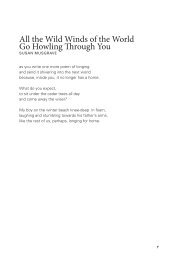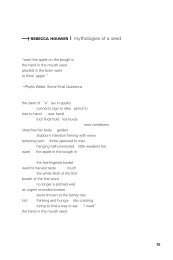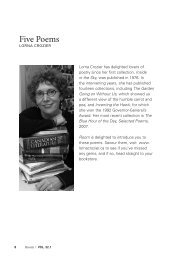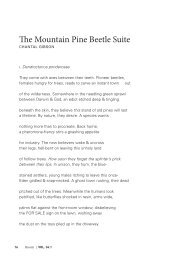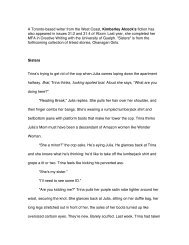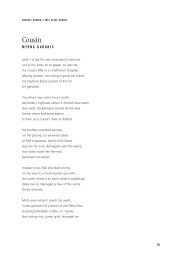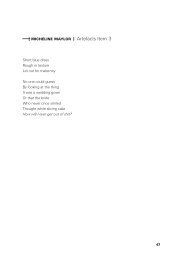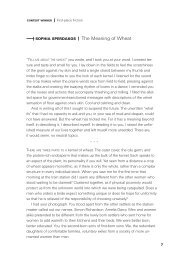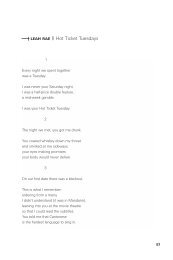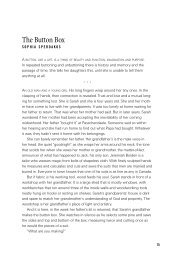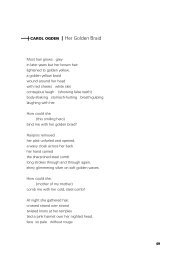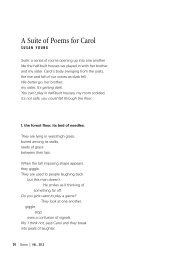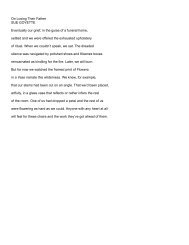Sample of creative non-fiction from 32.3 - "Amah ... - Room Magazine
Sample of creative non-fiction from 32.3 - "Amah ... - Room Magazine
Sample of creative non-fiction from 32.3 - "Amah ... - Room Magazine
Create successful ePaper yourself
Turn your PDF publications into a flip-book with our unique Google optimized e-Paper software.
<strong>Amah</strong><br />
DEVYANI SALTZMAN<br />
In 2006 Devyani Saltzman’s memoir Shooting<br />
Water was named one <strong>of</strong> The Bloomsbury<br />
Review’s Editor’s Picks <strong>of</strong> the year. In 2007<br />
<strong>Room</strong> published an interview with her. Now she<br />
returns to our pages with another memoir <strong>of</strong> her<br />
early years, this one focusing on the relationship<br />
between herself and <strong>Amah</strong>, her Indian nanny.<br />
I f o u n d h e r in literature o n ly o n c e, hiding in Salman Rushdie’s short-story<br />
“The Courter.” London, 1962, an Indian nanny walking down a street in<br />
Kensington with the edge <strong>of</strong> her “red-hemmed white sari” in hand. <strong>Amah</strong><br />
did the same as she cut through the pedestrian pathway at the end <strong>of</strong> our<br />
street, making a beeline for the 7-Eleven. But unlike Rushdie’s Kensington<br />
ayah, <strong>Amah</strong> never met and fell in love with the Eastern European hall porter<br />
<strong>of</strong> her employer’s building. She never had liaisons that involved a shared<br />
love <strong>of</strong> chess.<br />
<strong>Amah</strong> came to Canada when I was eight weeks old. I was told that her<br />
husband beat her and drank, although I never met him and she never talked<br />
about the beatings. Romantic love was <strong>of</strong> no interest to her, and whenever<br />
she saw a couple kissing on television and in the movies, she’d say “chee<br />
chee” in disgust and turn away. She arrived in our lives through the recommendation<br />
<strong>of</strong> an aunt in Delhi. Her previous charges had been the children<br />
<strong>of</strong> diplomats, although I couldn’t imagine <strong>Amah</strong> rotating through the threeyear<br />
cycle <strong>of</strong> embassy employees. All we knew was that she had come<br />
<strong>from</strong> a village outside Bangalore in the south Indian state <strong>of</strong> Karnataka. She<br />
was illiterate, the mother <strong>of</strong> five daughters, and didn’t know her own age.<br />
<strong>Amah</strong> would fly back to Toronto with my parents in January 1980.<br />
Canada required a work permit and a passport at that time, neither <strong>of</strong> which<br />
she had. My parents applied for both. As they filled out the work permit<br />
application before leaving India, my father explained that she would feel<br />
jet lag in the weeks after they arrived in Toronto. The city was ten hours<br />
7
ehind Delhi; a different time zone, a different season. <strong>Amah</strong> just started<br />
laughing, her round belly heaved. “Sahib, everyone knows it’s the same<br />
time everywhere.”<br />
My parents’ first home was in a neighbourhood <strong>of</strong> red brick Victorian<br />
houses, pr<strong>of</strong>essors, artists, and ex-hippies. It had two bedrooms, theirs and<br />
mine. <strong>Amah</strong> slept on the floor <strong>of</strong> the dining room, on a dark brown shag<br />
carpet between the radiator and the heavy wooden legs <strong>of</strong> the mahogany<br />
dining table. My first memory <strong>of</strong> her was as she slept, taking afternoon<br />
naps with the sunlight falling across her head, which lay cushioned on an<br />
outstretched arm. She kept her long black hair tied in a bun, and her belly<br />
gently rose and fell beneath a cotton sari. After she woke up, <strong>Amah</strong> would<br />
let me sit next to her under the dining table and look at the symmetrical tattoos<br />
on the tops <strong>of</strong> her hands and feet. Geometric designs in deep indigo,<br />
fading into her dark skin. One <strong>of</strong> our earliest conversations was about how<br />
she got them. <strong>Amah</strong> spoke broken English, Hindi, and the south Indian languages<br />
<strong>of</strong> Tamil, Telugu, and Kannada. She pointed at her hands and poked<br />
at the skin with her finger. The tattoos had been done with a sewing needle<br />
when she was very young. When she didn’t sleep on the dining room floor<br />
she slept on a mattress that slid out <strong>from</strong> beneath my white Ikea bed.<br />
In her twenty-three years in Canada, <strong>Amah</strong> had only two friends. Her first<br />
was Lucy, the Italian cleaning lady who came to our house once a week.<br />
Lucy was married, but she wore fitted black skirts and sleeveless black<br />
blouses as if she were a widow. They would sit on the stairs and talk during<br />
Lucy’s lunch break, heavy Italian and Indian voices gossiping and complaining<br />
about the church. Both women were Catholic. <strong>Amah</strong>’s patron saint<br />
was St. Anthony <strong>of</strong> Padua, a Franciscan always pictured with a child—the<br />
infant Jesus—and white lilies in his arms. <strong>Amah</strong> would sometimes walk the<br />
two blocks to Bathurst Street to visit Lucy in a little walk-up across <strong>from</strong><br />
Steven’s Grocery Store. She wore leather chappals on those walks, even in<br />
early winter after the first snowfall.<br />
After a few years, we moved up the hill to a neighbourhood with detached<br />
houses. It would be where we lived until I went to university, and<br />
the last home <strong>Amah</strong> would know in North America. She graduated <strong>from</strong> her<br />
space on the dining room floor to a stucco apartment in the basement. It<br />
suited her—private and dark, with enough space for her two favourite possessions,<br />
a television and an altar. She spent her time saying the rosary by<br />
candlelight and watching Magnum P.I., her favourite show.<br />
8 <strong>Room</strong> | VOL. <strong>32.3</strong>
SALTZMAN | <strong>Amah</strong><br />
The bedroom opened into a small, windowless antechamber that housed<br />
a cedar closet for her cotton saris and luggage. I hung three Indian prints on<br />
the wall in an effort to make it more home-like. As a teenager I thought she<br />
lived in near poverty; she thought she lived a life <strong>of</strong> privilege and thanked<br />
God every day. Her food, shelter, and medical expenses were taken care<br />
<strong>of</strong>, and she made weekly phone calls to her daughter Rita in Delhi to make<br />
sure the remittances had been received. I had no idea where her other four<br />
daughters lived or what they did. Their names were Violet, Mary, Iris, and<br />
Rose. We heard that <strong>Amah</strong>’s husband died at a home for disenfranchised<br />
men in New Delhi a few years after she immigrated, and that Violet died <strong>of</strong><br />
cancer soon afterwards. The only photo <strong>Amah</strong> had in her room was a preschool<br />
photo <strong>of</strong> me wearing blue Oshkosh overalls. She kept it in a plastic<br />
frame, nailed into the stucco between the television and the altar.<br />
Eleven years after <strong>Amah</strong>’s immigration, my parents divorced. Mom<br />
moved into a townhouse down the street, and for the next seven years<br />
<strong>Amah</strong>, Dad, and I would form an unorthodox nuclear family—a south Indian<br />
Catholic, a Jew, and a lonely child. My bedroom was two floors above<br />
<strong>Amah</strong>’s, at the front <strong>of</strong> the house. In summer the ivy would grow thick,<br />
and I could barely see outside my bay window. <strong>Amah</strong>’s room became my<br />
escape, a safe haven that smelled <strong>of</strong> must and the betel nut mixed with tobacco<br />
that she would chew for a mild high, staining her mouth a permanent<br />
red. She became my family then. “Ro mat, beti,” she would say, the only<br />
woman there to urge me not to cry as she folded her betel nut and tobacco<br />
into a paan in the darkness <strong>of</strong> that basement room.<br />
We spent time together in the kitchen, she on a worn wicker chair<br />
pushed against the wall below our wall-mounted phone, me eating her<br />
home-made rajma chawal at the white kitchen counter. During Christmas<br />
dinner and Passover she refused to eat with us at the same dining table<br />
she used to sleep under, instead taking her plate <strong>of</strong> food to the privacy <strong>of</strong><br />
her basement room.<br />
<strong>Amah</strong> decided to retire when I was too old to be fed every meal and<br />
when I preferred the company <strong>of</strong> friends to our shared space in the kitchen.<br />
I never thought that she would leave us. It was devastating, but I had little<br />
time to consider the vacuum created by her departure to Delhi. Our family<br />
friends and neighbours asked after her: “How’s <strong>Amah</strong>?” But my father had<br />
already begun searching for a replacement, and I just felt hollow whenever<br />
her name was mentioned. She had lived in Toronto for thirteen years, a<br />
9
landed immigrant who never chose to sponsor her children.<br />
<strong>Amah</strong> was replaced by a Jamaican woman named Angela. She left her<br />
six-year-old son behind in Port Antonio to inherit <strong>Amah</strong>’s basement apartment<br />
with attached cedar closet. She made the best spaghetti and meat<br />
sauce, but she didn’t love me. <strong>Amah</strong> had raised me, rubbing my infant arms<br />
with Johnson & Johnson baby oil to stimulate growth, putting gold jewellery<br />
aside for the dowry she imagined I would have as an adult.<br />
<strong>Amah</strong>-less, I began to notice women always on the move outside my<br />
bay window—pushing children in light-framed strollers, helping them out <strong>of</strong><br />
minivans along with bags <strong>of</strong> groceries, answering the door in striped-cotton<br />
T-shirts and flip-flops. They drove and had friends and went out on weekends<br />
(to sing karaoke at the strip malls at Bathurst and Wilson). They were<br />
a new kind <strong>of</strong> <strong>Amah</strong>, supported by social networks, mobile. Young. Ninety<br />
percent <strong>of</strong> domestic caregivers in Canada were Filipino women, brought<br />
into the country by nanny agencies and church networks, Olivias and Joannas<br />
who, in the words <strong>of</strong> one British journalist, “rubbed in the sore point<br />
that the feminism <strong>of</strong> the 1970s would have been broken by the insoluble<br />
problem <strong>of</strong> how to continue career and family if domestic servitude hadn’t<br />
been neatly passed <strong>from</strong> one group <strong>of</strong> women to another.”<br />
A young Filipino man was interviewed in the Georgia Straight about the<br />
difficulties reconnecting with his mother after she sponsored him to Canada.<br />
She was required to work twenty-four months in a three-year period<br />
before applying for landed immigrant status, and only then was she able to<br />
sponsor him. He was six when she left him, twelve when they reunited.<br />
The difficulties <strong>of</strong> their lost time haunted him even in adulthood.<br />
A BBC photographer did a photo essay on a Filipino nanny named Josie<br />
Pingkihar, working in Hong Kong. Of the US$470 she made a month, $390<br />
was remitted to her family. With $80 a month in pocket money, she cared<br />
for a six-year-old Chinese girl and slept on the floor <strong>of</strong> her bedroom, much<br />
like <strong>Amah</strong> and me. Her own children had started calling her “Aunty.” In<br />
2005 Filipino nannies sent home US$10 billion <strong>from</strong> around the globe.<br />
According to the Central Bank <strong>of</strong> the Philippines, women caring for other<br />
women’s children contributed 13.2 percent to the country’s economic<br />
growth.<br />
<strong>Amah</strong> came out <strong>of</strong> retirement when I was fifteen. She phoned my father<br />
<strong>from</strong> Delhi and told him that she missed me. She moved back as if she’d<br />
never left. However, the <strong>Amah</strong> who came back to a half-empty stucco<br />
10 <strong>Room</strong> | VOL. <strong>32.3</strong>
SALTZMAN | <strong>Amah</strong><br />
house was no longer the woman who rubbed my arms with baby oil, but<br />
someone I would begin introducing as my grandmother, out <strong>of</strong> a combination<br />
<strong>of</strong> guilt for having a nanny and pride for someone I loved. She had lived<br />
for two years with her daughter Rita and Rita’s husband, Cheena.<br />
It was unclear if the money she had earned in Toronto was in her own<br />
bank account or theirs.<br />
<strong>Amah</strong> had aged, and as a result she no longer had specific duties. She<br />
would come to my bedroom in the mornings <strong>of</strong> my years in high school,<br />
letting in the dog as she told me to wake up, balancing on the thick soles <strong>of</strong><br />
her bare feet, which were made rough by years <strong>of</strong> not wearing shoes. Her<br />
place in my room was a pine rocking chair with a quilted floral pillow. She<br />
would sit down in the chair and undo the massive bun carefully pinned to<br />
the back <strong>of</strong> her head. Her hair was still black, but thinning. <strong>Amah</strong> would pull<br />
it down past her shoulders and place strands <strong>of</strong> hair across her lap. She had<br />
bulked it up with extensions, bought at a Jamaican hair salon on St. Clair<br />
Avenue, down the street <strong>from</strong> the 7-Eleven. Since <strong>non</strong>e <strong>of</strong> us knew her age<br />
it was estimated to be somewhere around sixty. A birth date was chosen<br />
randomly—December 1—halfway between my father’s and mine.<br />
As soon as I got my driver’s licence, I began driving her to Gerrard Street<br />
on the weekends. Saturdays had been her market days, when we would<br />
go to Little India for vegetables and bhel poori at Bombay Bhel. Now she<br />
would sit peacefully beside me in a sari and green jacket as I drove the two<br />
<strong>of</strong> us down the Danforth. We drank south Indian c<strong>of</strong>fee and ate dosas at<br />
the Madras Dhaba. Afterwards we would cruise the video stores for the<br />
newest Bollywood titles. It was my way <strong>of</strong> reconnecting her with her south<br />
Indian roots, the next level after hanging Indian prints on her bedroom wall.<br />
After graduating <strong>from</strong> high school, I was accepted into a university in<br />
England. The year I left was the year that my father’s girlfriend moved in.<br />
<strong>Amah</strong>’s work now involved making the occasional cup <strong>of</strong> tea and cooking<br />
whenever she felt the desire to. Her monthly wage remained the same.<br />
She continued her walks to the 7-Eleven and Loblaws, but she stayed in<br />
her basement room more and more. My father and his girlfriend were both<br />
empty nesters who had inherited my nanny, and <strong>Amah</strong>’s Tupperwared Indian<br />
food remained untouched in the fridge. It was in that year <strong>Amah</strong> made<br />
her second, and last friend, in twenty-three years.<br />
Joanne was completing her doctorate in economics at the University<br />
<strong>of</strong> Toronto. She worked part time as a teaching assistant and part time in<br />
my father’s <strong>of</strong>fice. During my school terms in England, it was Joanne who<br />
11
earned <strong>Amah</strong>’s trust and <strong>of</strong>fered the support I wished I could give her. In<br />
the middle <strong>of</strong> winter, thin, blond Joanne would help <strong>Amah</strong>, increasingly<br />
arthritic, into her second-hand Saab, which smelled <strong>of</strong> cigarettes, and drive<br />
her to Loblaws, or the bank, or Little India.<br />
One holiday, <strong>Amah</strong> began rubbing her knees and told my father that<br />
the flights <strong>of</strong> stairs had become too much. Whenever I was at home I sat<br />
at the foot <strong>of</strong> her wicker chair and rested my head on her legs, <strong>of</strong>fering<br />
to massage them. After all, it was my growing up that led to her redundancy.<br />
When I went back to England, it was Joanne’s idea that <strong>Amah</strong> join<br />
the South Asian Women’s Association. Joanne drove her to a community<br />
centre near Bloor and Lansdowne once a month. After the tenth time <strong>Amah</strong><br />
told Joanne and my father that she didn’t want to go back. Why waste her<br />
time with a bunch <strong>of</strong> old women gossiping about their husbands, she said.<br />
Hers was already dead. Anyway, he was someone she would rather forget.<br />
<strong>Amah</strong> returned to her basement room, the monthly remittances to Rita, and<br />
her daily contact with love—Joanne.<br />
Dad told me he was letting go <strong>of</strong> <strong>Amah</strong> in the fall. The ivy covering the<br />
house had turned and the neighbourhood’s nannies were busy seeing their<br />
wards <strong>of</strong>f to school. <strong>Amah</strong> didn’t want to go back to India. At twenty-three,<br />
I didn’t want her to go either. I resented my father for forcing her retirement<br />
after two decades <strong>of</strong> service. She was my grandmother, our responsibility—<strong>Amah</strong><br />
to countless neighbours and friends. How could she be sent<br />
away? But there was no choice. Even though she had savings, she couldn’t<br />
manage an apartment on her own. <strong>Amah</strong> had no other friends and family<br />
in Canada. No network beyond our house, the 7-Eleven and the discount<br />
shops on St. Clair and Gerrard where she would haggle for goods. But<br />
there was another reason she had to leave, more painful than the logistics<br />
<strong>of</strong> surviving on her own. I too wanted my own life, and there was no room<br />
for my nanny in a grown-up world. I related to Rushdie’s narrator in “The<br />
Courter”: “For years now I’ve been meaning to write down the story <strong>of</strong><br />
Certainly-Mary, our ayah, the woman who did as much as my mother to<br />
raise my sisters and me.” Twenty-three years after immigrating, <strong>Amah</strong><br />
would go home to India. Remitted. Returned.<br />
La x m i Na g a r l i e s in t h e n o r t h e n d <strong>of</strong> New Delhi, on the eastern side <strong>of</strong> the<br />
Jamuna. The lower-middle-class neighbourhood is squeezed between a<br />
12 <strong>Room</strong> | VOL. <strong>32.3</strong>
SALTZMAN | <strong>Amah</strong><br />
congested roadway, funnelling traffic <strong>from</strong> the bridge, and the exposed<br />
sandy banks <strong>of</strong> the river. It takes forty minutes to reach <strong>Amah</strong> <strong>from</strong> my<br />
maternal grandparents’ home—<strong>Amah</strong>, my other grandmother, now living in<br />
an apartment with her blood daughter. The market below her apartment is<br />
crowded with clothing shops and general stores selling her beloved betel<br />
nut and tobacco.<br />
The taxi stops in front <strong>of</strong> a low-rise block <strong>of</strong> apartments. Rita is waiting<br />
at the bottom <strong>of</strong> a concrete staircase. She is now in her late thirties; a little<br />
younger than <strong>Amah</strong> was when she came to Canada in 1980. She has dark<br />
skin and sad eyes. Whenever I phoned for <strong>Amah</strong>, I spoke to Rita, and now,<br />
greeting her, I feel the shame <strong>of</strong> a cowering dog that knows it has transgressed.<br />
Somewhere, I always knew I took this woman’s mother away<br />
<strong>from</strong> her. Now, at our convenience, it is this daughter who will care for the<br />
aging mother who never wanted to return.<br />
Rita leads me up the stairs to a double entrance, a locked iron gate<br />
with a wooden door behind. A young woman answers the door wearing a<br />
salwar kameez and dupatta tied as if she’s been working, sleeves and hair<br />
pulled back. She is <strong>Amah</strong>’s maid, Sangeeta. <strong>Amah</strong>’s own domestic servant.<br />
Sangeeta lets us in. The apartment has three bedrooms and a narrow<br />
living room painted cream. A small balcony overlooks the telephone lines<br />
and market below. One bedroom is Rita’s, one is <strong>Amah</strong>’s and the third is<br />
devoted to Rita’s shrine—an extensive collection <strong>of</strong> Hindu, Christian, and<br />
Buddhist images placed in an aluminum mandir.<br />
“Devyani ayaa?” I can hear <strong>Amah</strong> ask if I’ve come as Rita leads the way.<br />
“Hah, <strong>Amah</strong>ji.” I’ve come, I say. The only reason my Hindi is alive is<br />
because we’ve spoken it together since I was a baby.<br />
She’s excited, sitting on her single bed, much thinner than I remember.<br />
It has been two years, and although I’ve spoken to her on the phone, I’ve<br />
never met her outside <strong>of</strong> the home we shared together. Our home.<br />
“Bheto, rani. Bheto.” She pats the bed as she barks orders. “Arre Sangeeta,<br />
chai banayo!” Someone else can make the tea.<br />
There is a white dog tied outside on the balcony, barking incessantly.<br />
Rita’s Pomeranian, Lily. There’s an Alsatian as well, a large female named<br />
Nancy. She sits loyally at <strong>Amah</strong>’s feet and reminds me <strong>of</strong> the golden retriever<br />
<strong>Amah</strong> left behind. Rita disappears into the kitchen. Only then do I feel<br />
comfortable hugging <strong>Amah</strong>, but what I really want to do is put my head on<br />
her lap and sleep like a baby. Instead I examine her room: a television, her<br />
13
own bathroom, a ceiling fan. Screwed into the wall is a white shelf, and on<br />
it is her altar, a perfect reproduction <strong>of</strong> the one in her stucco Toronto room.<br />
At least St. Anthony and the Virgin protect her in Laxmi Nagar, I think. There<br />
is only one photo on the wall, above a light switch glowing red, and it’s <strong>of</strong><br />
me. It’s the same preschool photo in blue Oshkosh that has always been in<br />
her room. I wish I could give this woman everything, but I cannot blame my<br />
father for wanting his freedom.<br />
“Daddy thik hai? Patricia thik hai?” She listens intently to news <strong>from</strong><br />
home.<br />
“Are you okay, <strong>Amah</strong>?”<br />
“Kya Karo?” What can I do? she says. She gives her shoulders a disheartened<br />
shrug as she takes betel nut out <strong>of</strong> a plastic case normally used<br />
for film. “Daddy nahin rakha.” Daddy didn’t keep me.<br />
I listen as she tells me how much she detests India. The food is expensive:<br />
rice, meat. The phone gets cut if she doesn’t pay extra. She misses<br />
Canada. But I look around, and she owns this apartment, she has people to<br />
care for her, we send her money to help her out, and I realize it’s more than<br />
food and comfort she craves, it’s being <strong>Amah</strong>. Her home hasn’t been taken<br />
away <strong>from</strong> her; her purpose has.<br />
Rita comes in with tea and snacks, and I let go <strong>of</strong> <strong>Amah</strong>’s hand. <strong>Amah</strong><br />
gives me a gold necklace with a pendant shaped like three Victoria head<br />
coins. She asks me when I’m going to get married.<br />
“When you have a home and husband, I’ll come and stay with you,” she<br />
says, smiling. She chews her paan and refuses to eat, insisting I do. Rita<br />
sips her tea and tells me that <strong>Amah</strong> loves to watch the Discovery channel.<br />
When <strong>Amah</strong>’s busy packing away her betel nut and tobacco, Rita looks right<br />
at me for the first time, and asks me the only thing she will ever ask me.<br />
“Sponsor me.”<br />
14 <strong>Room</strong> | VOL. <strong>32.3</strong>



